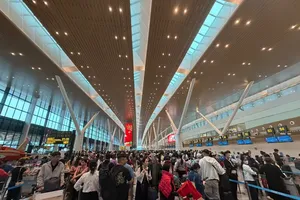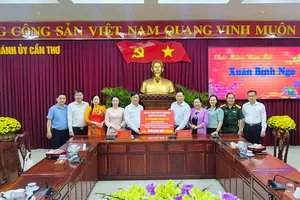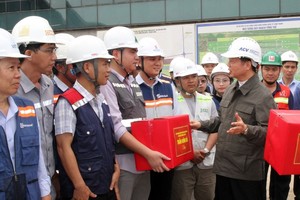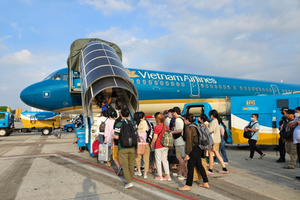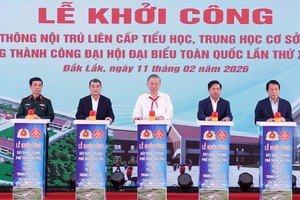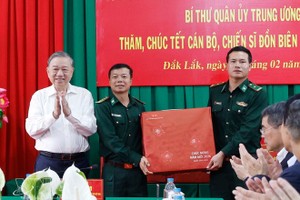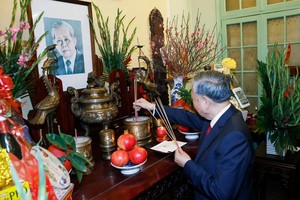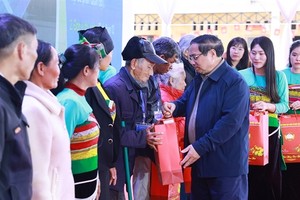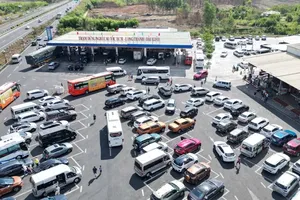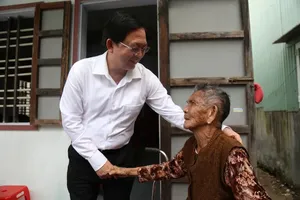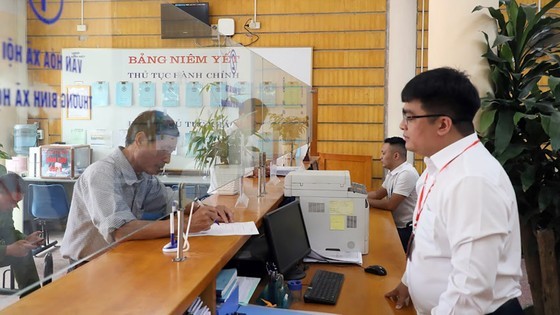 |
Citizens are carrying out administrative procedures at the People’s Committee of Ninh Hiep Commune of Gia Lam District in Hanoi (Photo: SGGP) |
Permanent Secretary of the Secretariat and Chairwoman of the Party Central Committee's Organization Commission Truong Thi Mai stressed on the need to have specific policies for young civil servants, along with perfecting necessary mechanisms, criteria to draw excellent university graduates and promising young scientists to the public sector as the next generation.
The Central Committee’s Organization Commission and the Central Committee of the Ho Chi Minh Communist Youth Union are going to co-visit localities that have flawlessly fulfilled the task of talent attracting in order to learn from them and propose to the Politburo suitable policies for young capable civil servants to prove themselves. The hiring process of such human resources is the responsibility of the local authorities and local Party Committees.
Secretary of Bac Ninh Province Party’s Committee Nguyen Anh Tuan stated that the Ho Chi Minh Communist Youth Union at different levels should have surplus human resources, consisting of engineers and bachelors of various fields. If successfully completing their assigned tasks, these people will be then sent to state units or localities where they can become managers, specialists. However, the current hiring mechanism makes it hard to recruit young talented people with high capacity into the political system as there is nothing appealing to them.
First Secretary of the Central Committee of the Ho Chi Minh Communist Youth Union Bui Quang Huy agreed on the necessity to upgrade current policies in order to effectively attract more young skillful people to the political system to answer the high demands right now. Simultaneously, all levels of the Party’s Committee, the local authorities, and state organizations should offer more favorable conditions for young civil servants to show off their own talents and prove themselves, followed by corresponding designation to suitable positions.
Deputy Secretary of Hanoi Party’s Committee Nguyen Van Phong cited Hanoi’s experience that the role of the city leaders is extremely important in boosting the growth of young talented civil servants. The more these leaders pay attention to young employees in the public sector, the better those talented people can bloom. In addition, young skillful people wish for fair evaluation and selection the most. Therefore, any suspicious or unjust decision might lead to young people turning away.
Deputy Minister of Foreign Affairs Nguyen Minh Vu commented that in such a harsh competition for talented people, the public sector needs to proactively approach outstanding young laborers. Despite the weakness in salary rates and fringe benefits, this sector can still offer non-material choices such as training opportunities abroad via the state budget with clear commitments or chances for them to contribute to the development of their community in positions of great influences. The sector’s advantages lie in long-term stability while the private sector follows the model of intense elimination of the weak.
Director Nguyen Thu Thuy of the Higher Education Department (under the Education and Training Ministry) stated that it is necessary to devise and pilot new models of managing, hiring, training, and using talents and intellectuals suitable for the modern context of the country and the world in accordance with socio-economic growth goals of each specific period.
She added that there must be a recruitment mechanism of excellent young people to the public sector in association with the market mechanism. This model must be flexible enough to attract high-level people. The salary policy must be upgraded so that intellectuals working in the public sector are paid and rewarded according to their fulfillment of assigned tasks, responsibilities, and thus helping them to make long-term contributions to their own organizations.
Chief of Transport Ministry’s Office Uong Viet Dung revealed that the Transport Ministry is now carrying out various major construction projects in the aspects of road, railway, waterway, and aviation. Such a heavy workload like this needs high-skill, capable civil servants who are ready to accept missions anywhere.
However, the recruitment process is encountering several obstacles due to hiring regulations in the Civil Servant and Public Employee Law, the most prominent being strict requirements in exchange for low salary and benefits. Since young talented people are offered many choices in the labor market now, it is nearly impossible to attract them to the public sector without preferential policies.
Chairman of the Vietnam Association of Administrative Sciences Tran Anh Tuan shared that his Association is assigned to research and then advise the Minister of Home Affairs about policies to make good use of the talented in the country, be they members of the Party or not, be they living in the country or not. They could be found among current civil servants, public employees, students, workers, scientists.
This talent-use policy must go on two ways of drawing the outstanding to make good use of them, which in turn helps to attract more people like them later. Anyone with talents, good virtue, and dedication should be chosen and used well regardless of their qualification, age, or place of residence.
On August 6, 2008, the 10th Central Committee of the Communist Party of Vietnam (CPV) introduced Resolution No.27-NQ/TW about developing the domestic intellectual workforce during the national modernization and industrialization. On April 7, 2023, CPV’s General Secretary Nguyen Phu Trong chaired a summary meeting between the Politburo and the Secretariat after 15 years implementing that Resolution.
According to the Politburo’s evaluation, there is a lack of suitable mechanisms, breakthrough policies, especially in the field of mobilizing resources to train, attract, and provide favorable conditions for intellectuals, leading scientists living at home and abroad. Therefore, the Politburo assigned the project management board to complete the project and prepare a corresponding report about possible special mechanisms and policies to make better use of these elite people in the future.





